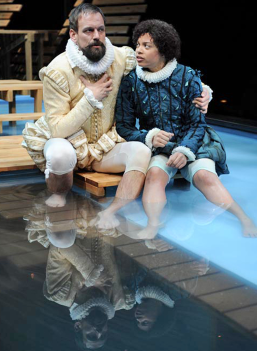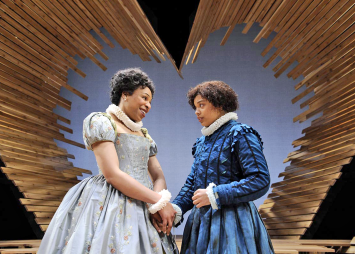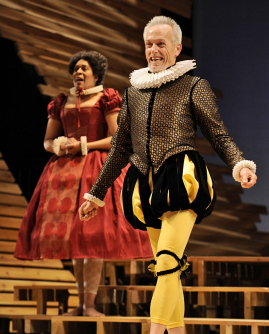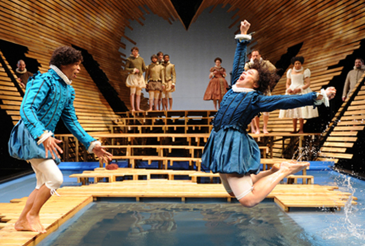Summary 
Impressive staging - a gigantic wood-slatted heart shape looming over an enormous swimming pool - from an English director and designer at a Chicago theatre. The pool is fully integrated into the production, which features a subdued Malvolio and an enhanced Feste plus an array of musical and song interludes. Many memorable moments in a big-budget entertainment that feels a tad overproduced.
Design
Directed by Josie Rourke. Designed by Lucy Osborne. Lights by Robert Wierzel. Sound by James Savage. Compositions by Alaric Jans. Fights by Matt Hawkins.
Cast
Mark Montgomery (Orsino), Michelle Beck (Viola), John Lister (Sir Toby Belch), Ora Jones (Maria), Dan Kenney (Sir Andrew Aguecheek), Ross Lehman (Feste), Karen Aldridge (Olivia), Larry Yando (Malvolio), Chris Sullivan (Antonio), Peterson Townsend (Sebastian), Dan Sanders-Joyce (Fabian).
Analysis
Guest Director Josie Rourke - along with designer Lucy Osborne from the Bush Theatre in London, England - brings to Chicago an imaginatively conceived Twelfth Night. Appropriately for a romance, the playing space is contained within the shape of a gigantic heart that rises twenty feet from the stage. And appropriately for a seaside adventure, the heart is comprised of an uneven series of long wooden planks as if from a boardwalk or pier. The upstage heart design looms over an enormous swimming pool - seven thousand gallons - that dominates downstage with a shallow rectangular wading area around a much darker and deeper central section. A planked boardwalk provides walking space in a square throughout the lengthy pool except for the stage left side, where performers must wade into knee-deep water. Rourke takes liberal advantage of Osborne's clever design, as her characters jump and fall and are pushed into the pool, splash each other, and emerge soaked and dripping throughout the performance. The only character sporting socks and shoes is, of course, the seriously buttoned-up steward, Malvolio.

Rourke's production begins with the stylish Duke Orsino languishing at stage left, a butler-attired servant holding an umbrella over his head as a stream of rain falls from the fly on top of them. Orsino's lovelorn "if music be the food of love, play on" is spoken to a violinist opposite him at stage right, and his ambassador returns from an embassy with Olivia cradling hands-full of crushed rose petals comically shred from proffered flowers. Moments later Viola appears in a splendidly dramatic surprise that recalls Ariel's zip-line flight to the stage at the nearby Steppenwolf Theatre's concurrent The Tempest. Viola drops straight from the fly in a harness and disappears with a resounding splash into the pool. Bubbles rise to the surface and pop, but she does not reappear, although her elaborate dress rises, still in the harness, to rise back into the fly. Following this impressive magic trick - the disappearing girl - Michelle Beck's Viola emerges dripping upstage as the Sea Captain covers her with a towel and counsels her regarding the dangers of Illyria. Beck displays an appealing confidence and intelligence, despite her character's dangerous situation, making her sudden lovesick inertia - she steals glances at Orsino, rolls her eyes in exasperation, and frequently turns to give a revealing gesture to the audience - all the more endearing.

Olivia and her household make especially good - and entertaining - use of the swimming pool. A hungover Sir Toby lurches from upstage, stripping away first his oversized shirt then his big bloomers, launching in a groaning sprawl into the water. The gray-haired Toby - echoing Sir John Falstaff - comically digs his toothbrush from a tankard floating in the pool, and he pulls a bottle of sack from a hiding place underwater to share with Sir Andrew. Upon Feste's arrival, Toby spins with joy - flinging sack in a splash across the stage - and after a belch he graphically resists nausea over his dinner of pickled herring. The shimmering water of the pool seems to actually be one of Rourke's characters: Aguecheek, in his ghastly fire-engine red page-boy haircut, arrives with matching red water wings around his upper arms and dives headfirst into the water; Malvolio curtly "returns" Cesario's ring by dropping it into the shallow end of the pool; Olivia, frantic with newfound love for Cesario, beats a pitter-patter on her chest, struggles to breathe, then kicks at the water before giggling and wading in with a laughing splash; Toby discards Andrew's laughable hate-letter by letting it fall into the pool with disdain; and Maria, after the successful deceit of Malvolio with the forged love letter, leaps with triumph feet first into the water, then stomps off upstage right with a whiplash splash from her long hair.
Malvolio and Feste, both distinct from the rest of the household due to their aversion to the water, are given unique amounts of emphasis by Rourke. Malvolio seems restrained, even taciturn, his scorn for the others apparent in a curled lip, wordless sneers, and withering glares. Almost militaristic in appearance, he wears black and gray with a white collar and cuffs as well as a precisely trimmed goatee and beard, and with his stiff posture appears to be always standing at attention. His puritanical streak, however, proves ineffective, and in the midst of dual romances, swimming pool antics, and drunken hijinks, plays as subdued and just the object of passing laughter. Malvolio's mere appearance in nightdress and cap causes the cast to laugh uproariously, and his final comment that "I will be revenged on the pack of you" excites little or no concern.
Feste, on the other hand, plays a more significant role in Rourke's conception, although as a traveling singer he provides little substance but just a healthier dose of physical comedy in addition to his songs. Feste sings with a guitar accompaniment in his initial appearance and his later song before Orsino and Cesario - "Come Away" - features hauntingly played twin violins. At intermission, the seated Feste, playing a drum, is joined by a violin player and guitarist downstage, and together they play a series of instrumental works, all of them lively and some of them sounding decidedly Irish. Feste concludes the intermission with a characteristically playful shave-and-a-haircut drumbeat, then trades barbs with Viola as the second act begins. He exits the scene swinging his bottom with an exaggerated strut, pausing to coyly conceal the back of his pants with the hand-held drum. Although entertaining, the focus on Feste seems to distend the production: the tormenting of Malvolio is less a comeuppance for a judgmental hypocrite than an opportunity for Feste to display an outrageous accent and strike exaggeratedly bemused poses upstage; and Feste's hambone flourishes and absurd pronunciation when reading Malvolio's letter of complaint to Olivia results in the interruption of the letter-reading not once or twice, but three times, and eventually Fabian must finish the task.

Rourke's elaborate comedy works best with subtle flourishes rather than heavy-handed schtick - although Feste's songs are wonderfully played and nicely sung - and charming moments are many: Beck's Viola speaks longingly in a double entendre of a man's beard on her chin, then points with a smile to an audience member who nods knowingly; the smiling Malvolio maintains his countenance with a struggle due to blood circulation difficulties caused by the tight cross-garters over his big yellow stockings; an arriving messenger loses her concentration at the sight of Malvolio and keeps taking wondering glances at his limping discomfort; Toby and Fabian flinch in fear from the babbling Malvolio, the former protecting himself with a crucifix, the latter with a Bible; both Toby and Andrew turn to look wonderingly beyond them when they are pointed at and referred to as "babbling drunkards"; and Olivia does a gleeful skipping dance down the ramp in a wedding gown as her minister joins her from offstage right. The comical duel between Aguecheek and Cesario sets a farcical tone for the production's conclusion. After Fabian and Toby outfit her with belt and sword, Beck's Viola trades playful swats to the shoulder with Fabian, then nearly passes out in his arms before asking another audience member if she can take the seat as a way to hide. After Sir Andrew warms up upstage with deep lunges - apparently pulling a hamstring in the process - he is knocked into the pool and gets out in a blustery huff, his baggy and layered outfit draining and dripping water in loud splashes, comically drowning out the ensuing conversation for several moments.

Soon after Malvolio is dropped from above within a harness - similar to Viola's shipwrecked descent - still within his yellow stockings, Viola is reunited with Sebastian, the siblings facing each other from opposite sides of the swimming pool. Olivia's response is amusingly carnal - "most wonderful!" - and the brother and sister each leap into the water to hasten their happy embrace. Rourke concludes the production with Malvolio's shrugged-off departure and, of course, another song from Feste. In a spotlight and holding an umbrella laced with holes, Feste sings "Hey Nonnie Nonnie" again accompanied by the violin player. The same rain that fell upon Orsino at the start of the production now falls upon Feste, but in a pleasantly happy closing stage-picture, the rainfall gives way to the gentle flutter of slowly falling rose petals. An over-abundance, perhaps, of theatric indulgences, Rourke's playful production proves to be inspired eye-candy entertainment, driven by Beck's central performance.